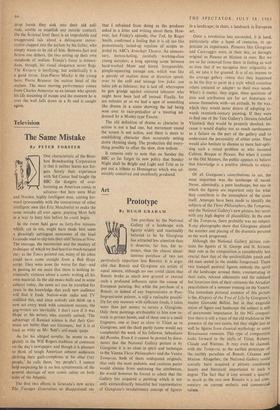BY now precious little of the debris of those times
has not been sieved through and served up in scores of military memoirs, biographies, analyses and apologia. Most of them are at odds with one another about everything under the sun, yet agreeing on only one thing : that among the Sam-Browned shower of stuffed shirts, heroes, incompetents, intriguers and occasional martyrs, by far the most outstanding shocker was Field- Marshal Sir Henry Wilson. Field-Marshal Wilson has the distinction of having had more con- tumely enthusiastically heaped on him than any public figure of his time. He has been Presented as the apotheosis of the 'political general,' the unscrupulous wire-puller whose irresponsible ambitions drove Britain into the Worst of wars without any plan for waging it, who communicated Cabinet secrets to the Oppo- sition during the Curragh mutiny, the arch-Tory who conned Lloyd George into making him `-'GS and undermining Haig. The partisan records may differ about everything else, but nobody loved Sir Henry. It is the contention of Basil Collier, in his biography of Wilson,* that all this is a most tilljust misconception and that the Field-Marshal has been traduced for years. The picture of the ruthless conspirator of calculated ambition is, in Mr. Collier's submission, not merely unkind but the direct opposite of the truth. The publishers Indeed go somewhat overboard on the other track, claiming that Wilson was 'not only one of the most selfless of public men, but by far the ablest British soldier of his day.' Inasmuch as this makes sense at all, it is explained to large degree by Sir Henry Wilson himself, who was as compulsive a diary-writer and name-dropper and journal-keeper as most generals seem to be. One of the great mysteries about the military life is the apparently endless foe these ranking commanders seemed to have
their daily jottings. Wilson's diary ran to
I'r e volumes. In 1927 they made the basis *BaAssuAT. By Basil Collier. (Seeker and War- aUrg, 30s.)
of a work by Major-General Sir C. E. Callwell, and pretty waspish some of them were. It is Mr. Collier's complaint that the Callwell biography used too much of Wilson's unguarded criticisms and hasty generalisations on his colleagues, and thus started the anti-Wilson legend that endures today.
This may well be so. Most of Wilson's detrac- tors have been every bit as parti pris on their side as is Mr. Collier on his. Brasshat offers posterity a Henry Wilson 'likeable, far-seeing, and many-sided,' who might, had he not been brutally murdered by Irish gunmen on his own doorstep in 1922, 'have made a second career as the energetic and progressive Tory leader whom the nation failed to find in Stanley Baldwin.'


































 Previous page
Previous page